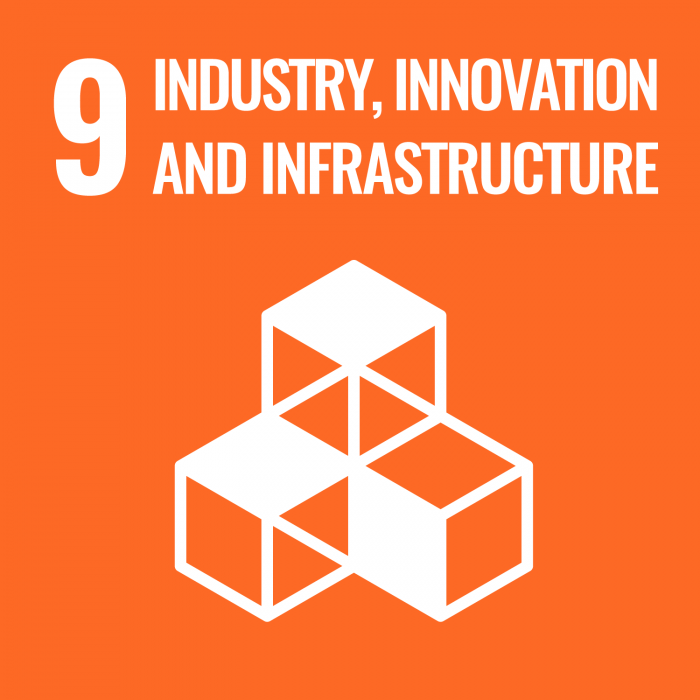SDG 9: Industry, Innovation and Infrastructure
Build resilient infrastructure, promote sustainable industrialisation, and foster innovation.

SDG9 targets the development of reliable, sustainable, and resilient infrastructure – either new or by upgrading aging or inadequate existing infrastructure. It also aims to promote inclusive and sustainable industrialisation. And, supporting these aims, it calls for greater investment in industrial innovation and R&D.
However, much basic infrastructure – including roads, communication technologies, sanitation, electrical power, and water – remains limited in developing countries, where it is present at all. Without it, progress toward other sustainable development goals will either be hindered or not possible at all.
When infrastructure development is coupled with inclusive industrialisation, the foundation is laid for economic growth that will improve living standards, facilitate innovation, promote international trade, and enable the efficient use of resources. The development of resilient infrastructure will also help reduce the impacts of climate change.
Through greater investment in research, innovation, and technology – in both developed but, more importantly, in less-developed countries – industrialisation can be decoupled from global carbon emissions growth, helping achieve climate action goals.
ot going fast enough to meet the goals of SDG7.
How CSC is making a positive difference?
The CSC certification significantly contributes to Sustainable Development Goal 9 by promoting innovation and enhancing the traceability of materials within the cement industry. Through its P5 criteria focusing on traced materials, CSC encourages companies to establish robust systems for tracking the origin and movement of materials throughout the supply chain. By ensuring traceability, CSC-certified companies can identify and address potential environmental and social risks associated with their sourcing practices, thereby fostering more sustainable and responsible production processes. Furthermore, CSC’s emphasis on innovation (B3 criteria) drives companies to develop and implement new solutions that enhance the sustainability of their operations and products. This encourages the adoption of advanced technologies and practices that improve resource efficiency, reduce environmental impact, and enhance overall sustainability performance, aligning with SDG 9’s objective of building resilient infrastructure, promoting inclusive and sustainable industrialization, and fostering innovation. Additionally, CSC certification encourages social investment (S1.02 criteria), further contributing to the development of infrastructure and communities, thereby supporting the goals of SDG 9.
Where does it appear in the Technical Manual ?
P5 – Traced Materials
P5.01 Traceability of materials
B3 – Innovation
Aim
To stimulate the development and implementation of new solutions that contribute to the sustainability of the operations, its products, its suppliers or other parts of the value chain, execution of best practices in the field of sustainability that are not covered by this certification systems, and exemplary performance under any criterion in this system.
S1.02 Social investment
How the cement and concrete industry is making a positive difference
Concrete is a key enabler of resilient and sustainable infrastructure development. As a sustainable building material, it combines durability, resilience to climate-related and natural disasters, cost-effectiveness and widespread availability. Without it, much of the modern world would not have been built – and much of what is still required to achieve SDG9 targets could not be built. Investment in infrastructure also supports industrialisation and innovation, helping to increase employment [link to SDG8] and output in industry and manufacturing (SDG9.2).
The cement and concrete industry has long supported R&D, resulting in innovations including more sustainable manufacturing techniques, higher-quality and blended cements, and new and improved use of its products. To continue and support this work, the GCCA founded Innovandi – the Global Cement and Concrete Research Network in 2019, which aims to accelerate innovation in the sector, as per SDG9.5.
Innovation is now particularly important to decouple the production of concrete from global carbon emissions growth. The industry takes this responsibility to sustainable industrialisation seriously and GCCA members are committed to driving down their CO2 footprints, aspiring to deliver carbon-neutral concrete by 2050, as part of the GCCA Climate Ambition.